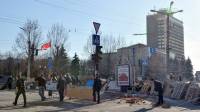Dangerous Security Service manoeuvres in Luhansk

A reputable NGO has just added weight to concerns regarding bafflingly contradictory stories about the seizure of the SBU [Security Service] building in Luhansk. The Luhansk regional branch of the Committee of Voters of Ukraine [CVU] has stated that “it cannot exclude the possibility that the Luhansk SBU could be acting as a unit of Russia’s FSB [Federal Security Service]”.
The SBU claimed on Wednesday that it had negotiated the release of 56 hostages, but that the building was still held by pro-Russian separatists. The latter are denying all assertions that they have mined the building and that they took anybody hostage.
There were reports at the outset that the separatists had broken into a store of arms and explosives, and so clearly the claims that the hostages could be used as human shields needed to be taken seriously.
Presidential candidate Serhiy Tihipko was briefly in the building on Tuesday night and said that he had seen no hostages, and now CVU has called the reports of 60 hostages “deliberate lies aimed at stirring up conflict and provoking the use of force in resolving the situation.” Their source from among those in the building says that there were no hostages from the outset. The only situation which bore any resemblance to hostage-taking was the attempt to detain Tihipko who had arrived to negotiate with the separatists. Even this plan was rejected, and Tihipko was simply thrown out and not allowed to speak to the demonstrators outside.
The Luhansk CVU notes that other actions taken by the local SBU have also led to an escalation in violence in the oblast. At 4 in the morning on April 5 the SBU detained 3 activists from a pro-Russian movement with serious irregularities. One of the three – Dmitry Soldatov – had his metal front door smashed in. Another is only 16 and the third was arrested in the presence of his heavily pregnant wife. The arrests took place on a day when pro-Russian protests were planned. With such a start obligingly provided by the local SBU, the protesters blocked the Alchevsk SBU after which all three were released. Just in time for them to take part in the seizure of the SBU in Luhansk.
CVU points out that there were similar arrests in Stakhanov, Rubezhnoye and Luhansk itself. One of those arrested, Alexei Rilke was transferred on April 6 from the SIZO or remand prison to the regional department of the SBU in Luhansk. He is now one of the commanders of the self-styled army of the South-East. Most worryingly, he claimed in a television interview that he had been given weapons from a supposedly mined ammunition room by the head of the regional SBU.
The SBU activities have been carried out at a time when the situation in the Luhansk oblast was much more stable than in the neighbouring Donetsk region, and when there had been a significant decrease in pro-Russian activism.
The 60-70 men who seized the SBU building were heavily outnumbered. There were at least 200 SBU officers who have had special training and had weapons and could have prevented seizure of a building holding both weapons and state secrets.
They did not.
Nor is it only the behaviour of the SBU that raises questions. In both Kharkiv and Donetsk a relatively small groups of separatists seized the regional administration buildings from which they declared the creation of so-called Kharkiv and Donetsk people’s republics. In Luhansk on April 6, the protesters gathered around the Luhansk regional administration but did not storm it. Instead they moved some considerable distance away and seized the SBU building.
This leads CVU to believe that the Luhansk SBU is carrying out a special operation aimed at provoking conflict. Pro-Russian activists were to seize the SBU building and be given weapons. The false information about hostages etc. CVU believes, was aimed at convincing Kyiv that enforcement bodies needed to be sent and the activists neutralized. The scenario would inevitably involve considerable bloodshed. The Luhansk regional CVU is therefore calling on interim president Oleksandr Turchynov and the head of the SBU, Valentin Nalyvaichenko to check whether the Luhansk regional SBU is not acting in the interests of Russia’s FSB.
Terrorists who take people hostage do so to use them in negotiations, and denying that they are holding them is senseless. Yes, the SBU could simply be trying to make themselves look like heroes by “freeing” non-existent captives. Having allowed a motley bunch of initially unarmed activists to take control of the building in the first place, the chances of being seen as heroes are remote.
There have been other suggestions over the last two days for why the activists seized the SBU building, including the actions having been commissioned by a leading Party of the Regions MP in order to ensure that compromising documents were destroyed.
Western countries have responded with appropriate criticism of Russia’s attempts to stir up separatist disturbances in eastern regions of Ukraine. They have yet to back the criticism with appropriately harsh measures despite the most compelling reasons for suspecting that Russia is doing very much more than simply paying people to make separatist demands.





